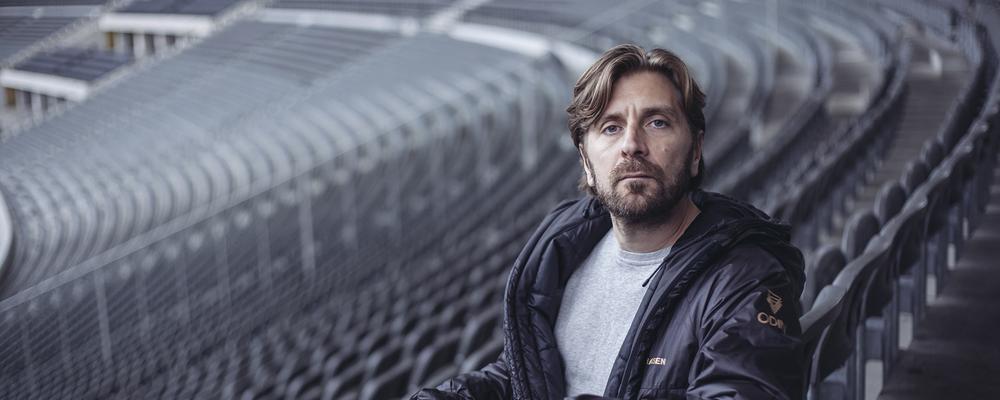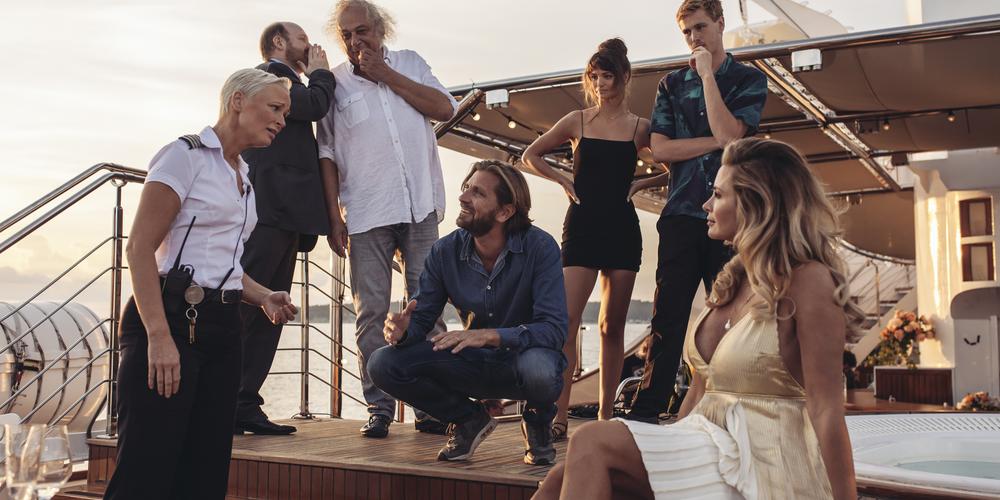
- Home
- News and events
- Find news
- Ruben Östlund – the student who became the professor
Ruben Östlund – the student who became the professor
Two-time recipient of the Palme d’Or Award and new honorary president of the Göteborg Film Festival: Ruben Östlund is clearly held in high esteem. We gave him a call to discuss his role as adjunct professor of film at HDK-Valand and to ask him for advice for aspiring filmmakers.
It´s been a hectic autumn for Ruben Östlund, who has been on the road for the launch of his latest feature film, Triangle of Sadness. But when we speak, he is at home in Vasastan, Gothenburg, and the circumstances are somewhat calmer, as he is currently spending time teaching film direction to the bachelor´s programme at HDK-Valand. The class “pitch your movie idea” is on the schedule. In the class, film students try to sell their idea, which is known in the industry as “pitching.”
“I try to encourage everyone who directs movies to get good at talking about their projects. That’s especially important in the beginning – to get into that mindset already during the first year of the programme.”
The students have seven minutes in which to take the stage in front of Ruben and their classmates. After that, they go through what worked and what could get better. Ruben may comment on things like unclear wording, body language, or tone of voice – content and presentation are both incredibly important.
“Almost no one likes public speaking, but I like to say that it’s going to feel great once you overcome that and can feel confident in this kind of situation.”
Inspiration from students
The students engage in the exercise with a clear goal in mind: they will all introduce themselves as directors at Novemberfestivalen, an annual film festival in Trollhättan. The clarity of the goal makes it easier to adapt the presentation to a particular occasion and audience. But Ruben knows this can be a challenging assignment for many.
“I generally say that you’re going to have fun, but on the way there, you’ve got to be a little humble, dare to challenge yourself and accept that you don’t know exactly how it’s going to look.”
He also says that there is a remaining, older assumption that a creative person must keep their ideas secret, and then astonish the world by surprise. He hopes that a new generation of filmmakers can step away from that idea.
“A creative process in which you try things out as you go and get input from other people allows your idea to develop. For me, this has been a really important work method.”
As an example, he says that a student inspired him to create a character in Triangle of Sadness. “At first I thought the cleaning lady who ends up on this desert island would be a male mechanic. But when I pitched the movie to a film class, one student said, ‘Wouldn’t it be more interesting if it were a woman from the ship,’ and I immediately felt that he was absolutely right, so I rewrote the role. The students I meet while teaching definitely inspire me.”

Pictures that can change the world
Ruben notes that the film programme at HDK-Valand is well-known internationally as well. He often receives questions from journalists who are aware of the film programme in Gothenburg and know he studied there. Today he has a position at the university as an adjunct professor, working 10% of full time. In addition to teaching the bachelor´s programme, he also teaches a directing class in the master’s programme. In that class, he shares his own directing method, which includes using improvisation to workshop certain scenes.
“I always think it’s really fun to meet students. Hearing them talk about their projects is always energising, and the area you work in expands when you understand that there’s a future generation that will take over. That gives the profession greater meaning.”
One thing that Ruben believes permeates HDK-Valand’s entire DNA, and which he considers important to send along with the students he meets, is that the pictures a filmmaker shows will change how people view the world and thus their behaviour. Ruben asserts that this entails responsibility and requires having awareness.
“That’s why we have to talk about how they’ll reach their intended audience. If you believe that your pictures communicate something important, something lacking in society, then you have to be able to fight for these pictures to get as much attention as possible. Your pictures are competing with a huge quantity of other pictures that might present a different view of the world – maybe that you do not agree with. So you have to do what you can in order for your pictures to get the most circulation and to have the biggest influence on people,” says Ruben. He continues,
“I don’t think students who make movies at filmmaking school should do so for its own sake – they should make movies so that their movies will be seen! How will you make sure your pictures are seen by as many people as possible, if you believe your content is interesting and important?”
First contact with the world of film
From 1998–2001, Ruben studied at the Högskolan för Fotografi, known as HFF (School of Photography), which became part of Akademin Valand – now HDK-Valand – in 2012. In other words, he was ones a student at the same school at which he now teaches.
When Ruben began his studies, he had already worked for a few years making ski movies, and windsurfing movies before that, at Styrsö in the southern archipelago of Gothenburg, where he grew up. He knew he wanted to work with film but had yet to decide what kind of movies or stories he wanted to tell.
How did you find your direction?
“It was absolutely shaped during my years at university. That was essentially my first contact with the world of film, film history and various directors. Before then, I hadn’t seen myself as a film director who could work with fiction, but at school I met people like Kalle Boman, and through him, Roy Andersson. During my second year in the programme, Roy Andersson premiered Songs from the Second Floor at Cannes, and I thought Cannes was the coolest place to have a premiere. One important event that I remember was when Kalle Boman brought us students to Stockholm to meet Roy Andersson at his studio. Roy had a picture on the wall of a film team and explained that they took the picture when they had decided to premiere at Cannes. That approach was so inspiring, that you could establish your goals and have the attitude that they were achievable.”
Has the programme changed much in the twenty years that have passed since you were a student?
“Yes; the major difference is digital development. When I was a student at the programme, those first small digital cameras for consumers had just come out. The Danes were working with Dogme 95 and a trend had started in film: people were filming with a lighter technique, cleaner and simpler. There was a kind of vitality, a curiosity.”
“At the same time, there were still clear limitations, like showing movies at the theatre. Filmmakers aspired to the feature film format and film festivals; there were only a few arenas where directors could show their work. It’s become harder today for students to know where to aim, because with all the digital arenas, there are almost too many choices. Getting students to understand which arenas they want to reach out to, what they want to achieve, and how to get attention in that particular space are important parts of a film programme.”
What else did gain from your studies?
“The contacts I made during the film programme have been hugely significant for me as a director. By that I mean not just teachers and meeting famous directors, but also my classmates. It’s so important to find a collective to work with. Now, when I’m back in Gothenburg, I take the chance to meet up with friends I met while studying. We still work together, and we still have just as much fun when we meet and discuss world events and the movie projects we’re working on.”
Lastly, do you have any advice for young people who want to go into the movie industry, or who want to apply to a programme in film?
“My tip is to look for something in which you are very interested and start filming there. To build up practical experience, you have to be interested in what’s in front of the camera; otherwise, the job will quickly feel meaningless. My career began with filming skiing. I quickly realised it was very easy to gather experience when I pointed the camera at something that was important to me. It didn’t feel like I had to exert myself – I didn’t get tired, it just felt easy. In a way, that’s what I still do: I’m still filming things that interest me.”
